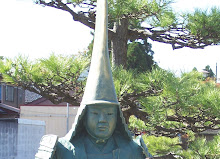The article on Japanese business etiquette describes a tragic incident involving a faulty elevator that led to the death of a young Japanese boy. The parent elevator company was Swiss, while the manufacturer was Japanese.
Ms. Otake correctly notes:
“A closer look at the company's handling of the event provides a cautionary tale for businesses operating in Japan, where a swift public apology after being linked to a scandal — regardless of who's chiefly to blame — is generally expected and taken for granted.”
Now this is part Japanese business etiquette and part Japanese culture. Apologizing in Japanese culture isn’t generally about guilt, but more about protocol.
In the west, with its Christian heritage, there is a close link between doing something wrong (sin) and personally repenting for it (confession); And this important aspect of western civilization is still practiced today in the Roman Catholic Church, which has never been a major cultural influence in Japan.
She quotes the executive of the Swiss elevator firm on his experience:
“‘I would say that our reaction was typically Western, especially an Anglo-Saxon type of reaction,' said Schindler… ‘When you are educated in, let's say, a multicultural environment as I was, and mainly in the United States, apologizing is always the admission of guilt. So not only by training as a lawyer, but genetically we are preprogrammed never to apologize until it is clear you are guilty."
Yes. I’d say that’s spot on – although I’m not sure what the U.S. being multicultural has to do with anything – and as far as saying it’s an ‘Anglo-Saxon’ reaction, I’d say that’s too narrow a perspective. I believe, as I've stated, that it’s the Christian underpinnings of western morality: admitting your sins before God is a serious act with eternal implications. It’s not strictly a sociological act as it is in Japan.
Ms. Otake continues:
“Indeed, in Japan, every time bad news breaks executives wearing uniformly dark-colored business suits meet the media, bow deeply and apologize profusely 'for causing a clamor' — though they are not always forthcoming about the details of the problem...Some even go as far as openly crying in front of television cameras to express remorse."
So true! And so Japanese! Can you imagine the c.e.o. of Enron, for example, crying and apologizing to the American people? No way! American executives are more likely to be found at a Jimmy Buffet concert in San Diego than prostrating in front of a camera crew.
I Like this writer very much! She doesn’t seem to be pro-Japanese or anti-Japanese in all the predictable ways – she’s interested in the truth of Japanese modern society. She then writes:
“Not that Japanese companies across the board are genuinely remorseful or have perfected the art of apology, either. Tatsumi Tanaka, in his 2004 book Sonna Shazai de wa Kaisha ga Abunai (Such Apologies Would Ruin Your Company), offers a long list of scandal-management flops by Japanese executives, who, despite apologizing, reinforced through their manner or response to subsequent questions their image as unrepentant, evasive or even antisocial.”
There is much about Japanese culture that is revealed in this paragraph! To make a great effort to publicly apologize, yet to not be particularly contrite. How human, of course, yet also how Japanese in particular ways.
And this kind of Japanese behavior can't be dismissed off-hand as phony or superficial - things are never that simple in Japanese society. Life in Japan - as wild as this will seem to westerners - isn't fueled by people's personal feelings. There are customs, traditions, expectations, taboos and other people to think of. This is a broad generalization, but how other people think of you, still matters in Japan. There is indeed something to all the fuss about Japanese group behavior and its affect on Japanese people.
Navigating Japanese society for the Japanese is no easy affair (we foreigners are exempt from this dance); by way of comparison, we might say that navigating all the expectations in Japan is akin to playing Chess while being blindfolded. While in contrast, making your way in American society is more like a rough and tumble game of dodge ball.








No comments:
Post a Comment